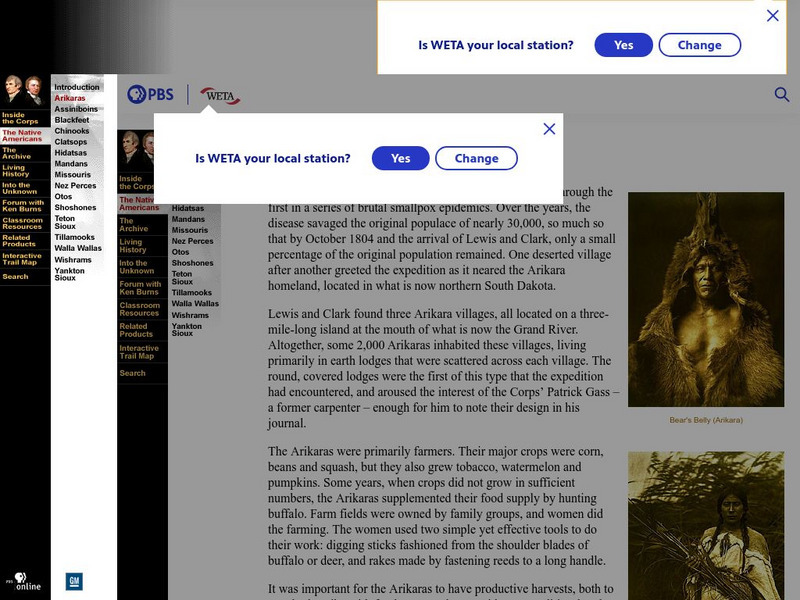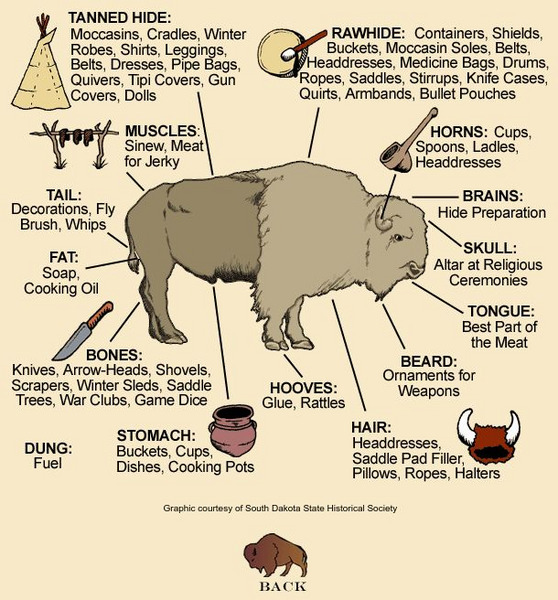Stephen Byrne
History for Kids: Maria Tallchief
History for Kids website offers an overview of the life of Maria Tallchief, a proud member of the Osage Indian tribe and prima ballerina for the New York City ballet.
PBS
Pbs: Arikara Indians
This site from PBS provides information about the Arikara Indians and the Lewis and Clark expedition.
Other
Distance Teaching and Learning: Uses Made of the Buffalo
Digital Dakota Network provides this site that contains a chart on the uses of various parts of the buffalo.
Harp Week
Harpweek: The American West: Slaughtered for the Hide
Short article about hunting and stripping buffalo for their hides, published in 1874 in Harper's Weekly.
Curated OER
Wikipedia: National Historic Landmarks in Colorado: Bent's Old Fort
Adobe fort built in 1833 to trade with Plains Indians and trappers, on Santa Fe Trail.
Curated OER
Wikipedia: National Historic Landmarks in Oklahoma: Fort Washita
Established in 1842 to protect the Choctaws and Chickasaws from the plains Indians.
National Endowment for the Humanities
Neh: Edsit Ement: Native American Cultures Across the United States
Students explore different aspects of the cultures of the First Americans in this lesson plan. Stereotypes are often associated with Native Americans through movies and in the context of the Thanksgiving holiday. Specific information and...
PBS
Pbs: New Perspectives on the West
This in-depth resource presents a history of the American West from pre-Columbian times until World War I with profiles, documents, and images. It encourages visitors to link these into patterns of historical meaning for themselves....
A&E Television
History.com: 10 Things You May Not Know About Sitting Bull
Get the facts about one of the most legendary Native Americans of the 19th century. Sitting Bull was born around 1831 into the Hunkpapa people, a Lakota Sioux tribe that roamed the Great Plains in what is now the Dakotas.
Countries and Their Cultures
Countries and Their Cultures: Kurds
The Kurds have inhabited an area of rugged mountains and high plains at the headwaters of the Tigris and Euphrates rivers for over two thousand years. Their traditional mode of subsistence is pastoralism and agriculture. The territory...
PBS
Pbs: Teton Sioux Indians
This site from PBS contains an article on the Teton Sioux Indians and the Lewis and Clark expedition.
PBS
Pbs: Yankton Sioux Indians
Provides information on the Yankton Sioux Indians and the Lewis and Clark expedition.
Curated OER
Etc: Maps Etc: Babylonia Before the Semitic (Chaldaean) Conquest, About 4000 Bc
A map of Babylonia, in current Iraq, before the Semitic (Chaldaean) Conquest, about 4000 B.C. This map shows the early territories of Makan and Melucha between the rivers Tigris and Euphrates, with the Makan capital Ur inhabited by the...
Curated OER
Educational Technology Clearinghouse: Maps Etc: South China, 1971
"South China comprises the drainage basins of the middle and lower Yangtze River, the basin of the His Chiang (West River) in Kwangtung and Kwangsi; and the mountainous coastal provinces of Fukien and Chekiang. The division between the...
Curated OER
Wikipedia: National Historic Landmarks in Minnesota: Pipestone National Monument
Pipestone National Monument preserves traditional catlinite quarries just north of Pipestone, Minnesota. The catlinite, or "pipestone", was and is used to make peace pipes, vitally important to traditional Plains Indian culture. The...
Curated OER
George Catlin and Indian Guide Approaching Buffalo Under White Wolf Skins
This National Humanities Center site offers an article which examines the main techniques on how the Plains Indian tribes hunted the buffalo.
Curated OER
Carl Wimar, Buffaloes Approaching Water Hole, 1860
This National Humanities Center site offers an article which examines the main techniques on how the Plains Indian tribes hunted the buffalo.










